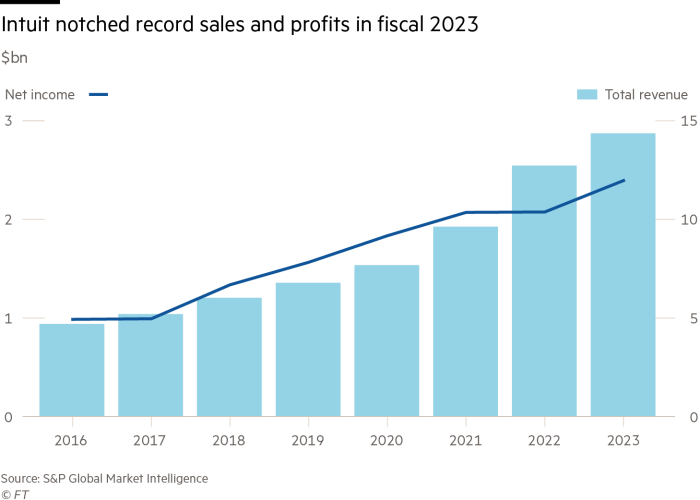
Unlock the Editor’s Digest for free
Roula Khalaf, Editor of the FT, selects her favourite stories in this weekly newsletter.
Investor enthusiasm for all things artificial intelligence propelled shares in chipmakers and Big Tech to new heights.
But the AI boom has also produced some unexpected winners. Intuit, which makes the popular TurboTax software, is one of them. The stock has gained nearly 40 per cent over the past 12 months, outpacing the S&P 500’s 20 per cent rise. At $170bn, its market valuation towers over that of Goldman Sachs, Morgan Stanley and Citigroup.
Intuit is best known for its small-business accounting and DIY tax-filing software. In recent years, the company has sought to diversify through acquisitions. It bought personal finance company Credit Karma for $8.1bn in 2020 and email marketing provider MailChimp for $12bn in 2021. But it is Intuit’s talk of AI that is bringing out the Wall Street bulls.
The company reckons that AI can make tackling US tax returns — with its W-2s, 1098s and other obscurely coded documents — easier. It has rolled out an AI assistant across its core products. In TurboTax, AI will shorten the time it takes to file taxes by calculating deductions and answering questions on code changes. Likewise, the technology can offer personalised financial advice to Credit Karma users and help generate marketing content for customers at MailChimp. Chief executive Sasan Goodarzi declared in February: “The next leg of growth is AI.”

Analysts expect revenue growth of 12 per cent this fiscal year to July, followed by 13 per cent in the following two.
But making money from AI could prove to be easier said than done. Early reviews of the AI chatbots have been scathing. Inaccuracies are the main complaint. Intuit said AI was not completing or filing a tax return in TurboTax: “If a TurboTax filer ever has a question about their tax return, they are only a click away from a live tax expert at all times.”
As befits an AI proxy, Intuit doesn’t look cheap on 36 times forward earnings. Smaller rival H&R Block trades on a multiple of only 12 times.
But this premium has more to do with bog-standard accounting than cutting-edge tech. Its QuickBooks accounting software is widely used by freelancers and small businesses and helps Intuit to make money all year round while H&R Block’s business is almost entirely seasonal. Intuit’s popularity among small business owners has underpinned its growth.
That is a better reason than AI hype to invest in the stock.

